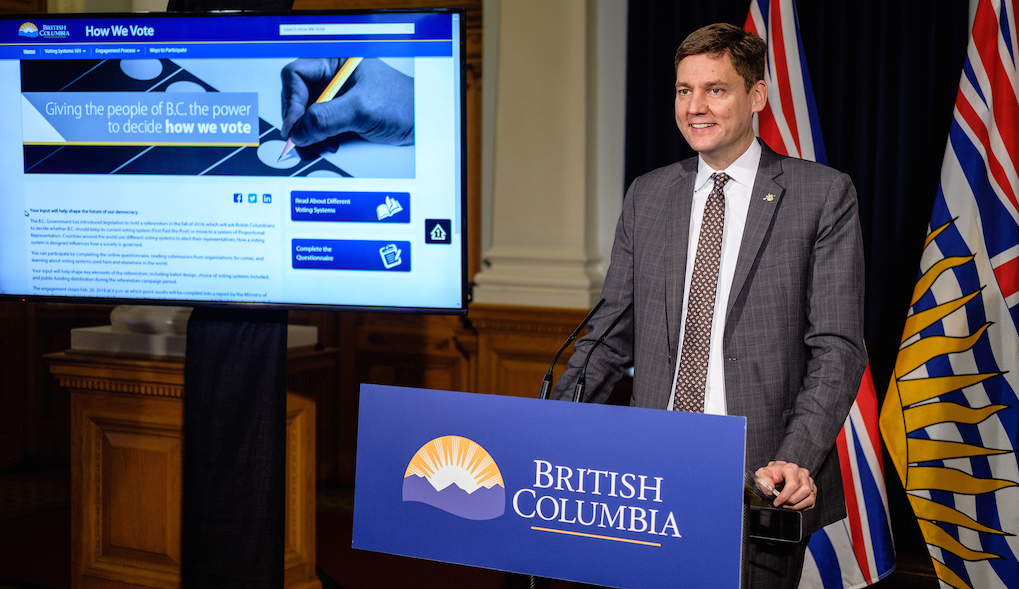Among the fear-mongering claims of the “no” side in B.C.’s electoral reform debate, a favourite trope is that proportional representation (pro rep) will result in unstable minority governments that can’t get anything done.
The claim is unsubstantiated nonsense.
That said, one assumption from the claim is true; namely, that pro rep almost always produces minority or coalition governments. Which is great!
Minority outcomes result in more cooperation in our politics. Parties have to put together governing alliances or coalitions that, in combination, reflect the majority of voters. And they are forced to collaborate on policies that better reflect the desires of a majority. The culture, tone and practice of politics is less divisive. After all, parties cannot viciously antagonize other parties whose support they may need in order to govern.
Want to know what that looks like? You can see it now in B.C., and specifically in the Confidence and Supply Agreement between the B.C. NDP and the B.C. Green Party. Minority governments often rely upon agreements such as this, where the terms of the alliance are transparently spelled out in black and white.
Minority or coalition governments are also more accountable, as parties cannot win false majorities that allow them to rule with impunity for four years. Rather, they must continually secure the support of other parties, forming alliances that represent a true majority of voters. Junior coalition partners are able to hold governing parties more to account. I would contend that, under the current minority B.C. government, the Greens are holding the NDP more accountable for their own election promises than would be the case had the NDP won an outright majority.
In other countries, the minority governments produced under pro rep have proven to be plenty stable, with elections occurring no more often than under our current first-past-the-post (FPTP) system. According to research by political scientist Dennis Pilon that compared the voting history of pro rep countries versus countries with FPTP systems such as ours, between the Second World War and 1998, the FPTP countries had on average 16.7 federal elections, while the pro rep countries had an average of 16. In other words, big picture, no notable difference.
Of course FPTP also produces minority governments from time to time (such as we have now in B.C. and New Brunswick). But minorities under pro rep are likely more stable than minority governments produced under FPTP. That’s because, as Andrew Coyne has noted, under FPTP, small shifts in the vote can produce dramatically different results (witness our last B.C. election, where a few dozen votes in the riding of Courtenay-Comox spelled the difference between another Liberal majority versus the minority NDP government we now have). This leads to a strong temptation for parties to bring down a minority government and force an election whenever they think the polls and political timing are in their favour.
In contrast, under pro rep, small shifts in voting patterns only produce small shifts in outcomes. Given this, the temptation to force an early election is much less. It only makes sense if there has been a major shift in public attitudes.
And what of the claim that minority government can’t get things done, or are unable to introduce bold new policy? Again, bunk.
Some of our nation’s most popular and long-lasting policies — from the Canada Pension Plan to Old Age Security to medicare itself — were enacted under federal minority governments.
Similarly, in B.C. today, we’ve seen a refreshingly cooperative situation that is tackling poverty and the housing crisis. This minority government is increasing investments in education, health care and infrastructure. And in its first year, B.C.’s minority government has introduced public child care — the first major new social program of a generation — and progressive tiers to property taxes — a first in North America.
And of course, add to that the possibility that this minority government will deliver a modern electoral system — pro rep — a game-changing policy that can positively transform our politics for generations to come.
Quite simply, the notion that minority governments can’t bring about bold new policy is nonsense.
In the wake of an election with a minority result, does it sometimes take a few weeks to emerge with a clear outcome, knowing who will command the confidence of the legislature? Sometimes, and so what?
We can all recall the summer of 2017, when after the last B.C. election it took two months before we knew who would form government. It all made for some good fun and exciting political drama. But the sky did not fall. In the face of serious matters such as that summer’s forest fires, the system worked just as it should; the outgoing ministers continued to do their jobs. Our democratic institutions and the operations of government continued to function.
Over 80 per cent of OECD countries use some form of pro rep, and most are very stable. Not only do they have stable governments, but they have notably more stable policy environments, rather than experiencing “policy lurches” as power swings back and forth between false majority governments.
So, with respect to this false contention from the “no” campaign: as with so many of the other claims, park this one away. There’s no need to vote from a place of fear.
Seth Klein is B.C. Director of the Canadian Centre for Policy Alternatives. This post originally appeared on the B.C. CCPA’s Policy Note blog.
Photo: Province of British Columbia/Flickr
Help make rabble sustainable. Please consider supporting our work with a monthly donation. Support rabble.ca today for as little as $1 per month!




